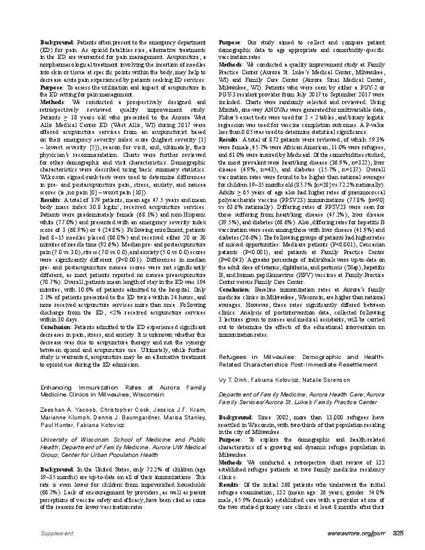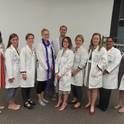
- refugees,
- resettlement,
- family medicine,
- residency,
- primary care,
- sociodemographics
Background: Since 2002, more than 13,000 refugees have resettled in Wisconsin, with two-thirds of that population residing in the city of Milwaukee.
Purpose: To explore the demographic and health-related characteristics of a growing and dynamic refugee population in Milwaukee.
Methods: We conducted a retrospective chart review of 122 established refugee patients at two family medicine residency clinics.
Results: Of the initial 268 patients who underwent the initial refugee examination, 122 (mean age: 26 years; gender: 54.0% male, 45.9% female) established care with a provider at one of the two studied primary care clinics at least 8 months after their initial screening examination. Refugees were predominantly Asian (72.1%), primarily from the countries Myanmar (43.4%) and Malaysia (25.4%). Additionally, while up to 20.5% spoke more than two ethnic languages, the main languages spoken were Burmese, Rohingya, and Karen. Prevalent health topics included newly diagnosed pregnancy (29%), latent tuberculosis (22% [92% completed treatment]), anemia (17%), dyslipidemia (14%), smoking (24%, including both current and former smokers), betel nut use (11%), and vitamin D deficiency (8%). Weight issues also were prevalent, with overweight body mass index (31.1%) more prevalent than obesity (13.9%) or underweight body mass index (7.4%). Prevalent health systems included musculoskeletal (23.7%) and gastrointestinal (17.2%). Screening rates for cervical cancer, colon cancer, and breast cancer were 57.8%, 58.3%, and 75%, respectively.
Conclusion: By identifying common health care issues and sociodemographic characteristics of our refugee patients, this study will better prepare providers for a more streamlined and equitable approach toward improving the health of this vulnerable population.
Dinh VT, Kotovicz F, Sorenson N. Refugees in Milwaukee: demographic and health-related characteristics post-immediate resettlement. J Patient Cent Res Rev. 2018;5:325-6.
